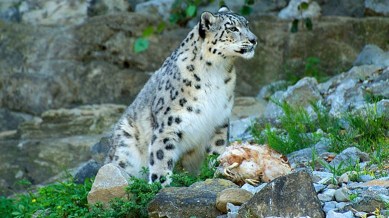📣 For more lifestyle news, click here to join our WhatsApp Channel and also follow us on Instagram
10 fascinating animals you might encounter on your trip to the Himalayan region
Spanning India, Nepal, Bhutan, Tibet, and Pakistan, the region is home to some of the most elusive and majestic wildlife species

The Himalayas, one of the most breathtaking mountain ranges in the world, is not just a haven for trekkers and spiritual seekers but also a biodiversity hotspot.
Spanning India, Nepal, Bhutan, Tibet, and Pakistan, the region is home to some of the most elusive and majestic wildlife species. If you’re planning a trip, here are some fascinating animals you might encounter in the Himalayan wilderness.
monthly limit of free stories.
with an Express account.
1. Snow Leopard (Panthera uncia)
One of the most elusive and endangered big cats, the snow leopard is often called the ghost of the mountains. These majestic predators are found in high-altitude regions, camouflaged perfectly against the rocky, snowy terrain. Your best chance of spotting one is in Ladakh, Spiti Valley, or Hemis National Park in India.
📍 Best places to spot: Ladakh, Spiti Valley, Hemis National Park (India), Annapurna Conservation Area (Nepal)
2. Red Panda (Ailurus fulgens)
Unlike the more famous giant panda, the red panda is smaller, more agile, and lives in the dense forests of the eastern Himalayas. Recognised by its reddish fur, bushy tail, and adorable face, this species is highly endangered due to habitat destruction.
📍 Best places to spot: Singalila National Park (India), Langtang National Park (Nepal), Jigme Dorji National Park (Bhutan)
3. Himalayan Brown Bear (Ursus arctos isabellinus)
The Himalayan brown bear, a subspecies of the brown bear, is found in the high-altitude meadows of the Himalayas. These bears are larger than their black bear cousins and are critically endangered due to habitat loss and poaching.
📍 Best places to spot: Great Himalayan National Park (India), Deosai National Park (Pakistan), Sagarmatha National Park (Nepal)
4. Tibetan Wolf (Canis lupus chanco)
One of the oldest wolf species, the Tibetan wolf has adapted to the harsh conditions of the Himalayan plateau. It plays a key role in the ecosystem by keeping the prey populations balanced.
📍 Best places to spot: Ladakh (India), Mustang Valley (Nepal), Qinghai-Tibet Plateau (China)
5. Himalayan Monal (Lophophorus impejanus)
The Himalayan monal, also known as the danphe, is the national bird of Nepal and a dazzling sight in the Himalayas. With vibrant plumage and iridescent colors, spotting this bird in the wild is a treat for birdwatchers.
📍 Best places to spot: Kedarnath Wildlife Sanctuary (India), Langtang National Park (Nepal), Jigme Dorji National Park (Bhutan)
6. Blue Sheep (Bharal) (Pseudois nayaur)
The blue sheep, or bharal, is a common sight in the Himalayan highlands. These agile climbers are a primary food source for snow leopards and can be seen in large herds navigating the rocky slopes.
📍 Best places to spot: Spiti Valley (India), Annapurna Circuit (Nepal), Tibet
7. Himalayan Musk Deer (Moschus leucogaster)
Known for its prized musk, this small, shy deer is found in dense forests and high-altitude meadows. Unfortunately, due to poaching for its musk glands, the species is endangered.
📍 Best places to spot: Nanda Devi Biosphere Reserve (India), Langtang National Park (Nepal), Jigme Dorji National Park (Bhutan)
8. Himalayan Tahr (Hemitragus jemlahicus)
This wild goat species is an expert rock climber, thriving in steep, rugged terrain. Himalayan tahrs are commonly seen grazing on cliffs, blending seamlessly into the surroundings with their thick, brown coats.
📍 Best places to spot: Annapurna Conservation Area (Nepal), Valley of Flowers (India), Bhutan
9. Tibetan Antelope (Chiru) (Pantholops hodgsonii)
The Tibetan antelope, or chiru, is known for its soft, warm undercoat used in the illegal production of shahtoosh shawls. Once heavily poached, conservation efforts are helping to stabilise its population.
📍 Best places to spot: Changthang Wildlife Sanctuary (India), Tibet
10. Himalayan Black Bear (Ursus thibetanus)
Unlike their brown bear cousins, Himalayan black bears prefer forested regions and are omnivores, feeding on fruits, insects, and small animals. They are known for their distinctive white chest markings.
📍 Best places to spot: Dachigam National Park (India), Langtang National Park (Nepal), Jigme Singye Wangchuck National Park (Bhutan)
Best time for wildlife spotting in the Himalayas
The best time to see Himalayan wildlife depends on the species and region:
✔ Summer (April–June): Ideal for trekking and spotting animals in high-altitude meadows.
✔ Winter (November–February): Best for snow leopard spotting in Ladakh and Spiti.
✔ Monsoon (July–September): Great for birdwatching, but some trails may be inaccessible.
So, the next time you visit the Himalayas, keep your eyes peeled—you never know what rare and fascinating creatures you might encounter!
📣 For more lifestyle news, click here to join our WhatsApp Channel and also follow us on Instagram